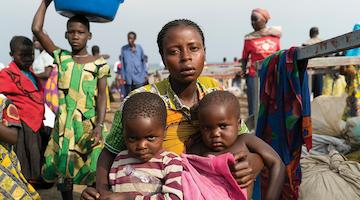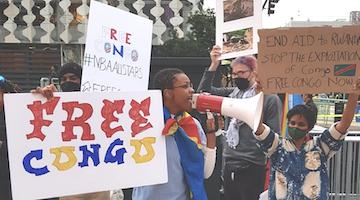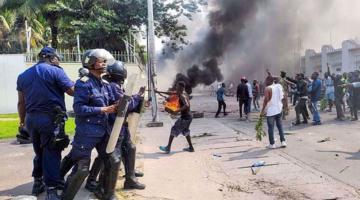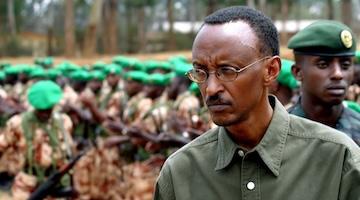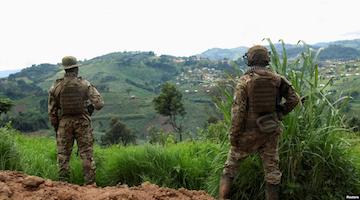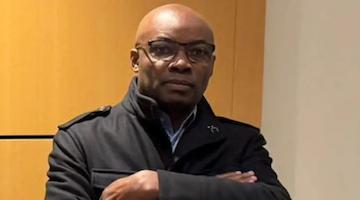Reuters, J. Bizimana
Ann Garrison continues her series of reviews of books important to understanding the Rwandan Genocide and Rwanda as it is today during this 30th anniversary year of the 1994 massacres.
In 2009, foreign correspondent Anjan Sundaram went to Kigali, Rwanda, to teach journalism in a program funded by Britain and the European Union. Four years later his most talented student, a young man named Gibson, suffered a mental breakdown from the stress of being constantly surveilled, harassed, threatened, beaten by police, and betrayed, even by his best friend, another journalist who crossed over to support the repressive regime of Rwandan President Paul Kagame.
By that time Gibson had escaped to Uganda, but he still feared the Rwandan government and for good reason. Rwandan journalist Charles Ingabire was assassinated in Uganda in 2011. Listening to Gibson collapsing in paranoiac delirium over the phone, Sundaram pleaded with him to see a doctor, but to no avail. He was by then too afraid of everything and everyone.
Gibson’s tragic story runs all through Sundaram’s book, Bad News: Last Journalists in a Dictatorship. It also includes the story of Agnes Uwimana, a journalist who wound up in prison, leaving her young son without his mother, for suggesting that Rwandans were unhappy with their government. Others gave up and became government propagandists, and one, who befriended Sundaram, turned out to be a government agent assigned to spy on him.
In a 12-page appendix, Sundaram lists journalists assaulted, jailed, kidnapped, missing, killed, or in exile for criticizing Kagame’s government. He says it’s not even an exhaustive list, despite having 60 entries.
The government narrative, echoed by the likes of Bill Clinton and Tony Blair, is that Rwanda has ended hunger and reduced poverty, that it proceeds on a democratic path of progress, but the struggles of the journalists and Sundaram’s own experience belie all that.
The book begins as he arrives to investigate a grenade explosion, but the area has been quickly cleared, and police tell him nothing happened, that he’s just imagining things. This is the first of many increasingly Orwellian moments.
Was the explosion the work of challengers to Kagame’s overarching power or perhaps a provocation by the government itself? Either way, that and further grenade explosions became cause for more government repression.
In one harrowing rainy season episode, Sundaram travels deep into the Rwandan countryside, where he sees peasants who have destroyed the thatched roofs of their own traditional huts, leaving themselves exposed to the elements. Many, including all the children and many of the elderly, are languishing with malaria from exposure to the rain.
Why? The president had declared that the traditional huts with their thatched roofs were too primitive and ordered them to destroy the roofs before building any structures to replace them. The people obeyed and even told Sundaram that the government had issued the order because it cared about them. Was this because they feared resisting or criticizing the president or because they’d so completely absorbed government propaganda that they applauded their own dictated self-destruction? In any case, the consequences were horrific; the region looked like a war zone without a war.
Sundaram describes the all-encompassing government control of Rwandan society, where Kagame rules through a nationwide system of villages. “The country was organized into administrative units benignly called ‘villages.’ Each village, or umudugudu, contained about one hundred families. Even the capital was but an agglomeration of such villages. The president called his office Urugwiro village. Each village had its head, its security officer and its ‘journalist’ or informer, all of whom had to approve of one’s behavior if one wanted something from the government—a passport, for example.” Although Sundaram, in the title of his book, describes Rwanda as a dictatorship, this is more like totalitarianism, where every aspect of everyone’s life is surveilled and controlled.
Every bit as disturbing as Sundaram’s descriptions of life in Rwanda are his accounts of how governments, multilateral institutions, NGOs, and academic institutions—which he lists in his first appendix—enable the regime. Governments include not only the US, the UK, and other European governments, but also the People’s Republic of China and Japan. Multilateral institutions include the European Union, UN, World Bank, IMF, African Development Bank, and Global Fund. Nonprofits and academic institutions include the Clinton Foundation, the Tony Blair Africa Governance Initiative, the Bill and Melinda Gates Foundation, the World Economic Forum, Harvard University, and Partners in Health. All these despite evidence of Kagame’s reign of terror. In 2009, Bill Clinton presented him with a Global Citizen Award, and he is regularly invited to the World Economic Forum in Davos. Renowned universities have presented him with honorary doctorates, and Harvard is among the many who have hosted him as a guest lecturer. Sundaram’s book should disgrace all these great powers and institutions.
At one point in his narrative, Sundaram takes hope in an embassy official’s promise to help him create safe space for the journalists to work. While attending a farcical government conference on media freedom, what he calls “another piece of theater for donors and diplomats,” he approached some of the embassy officials and asked if they believed the government was sincere. “A farce, a farce,” one said. “They are not sincere about stopping the repression. They are trying to distract us from the real problems.” He was, Sundaram points out, from the embassy of one of the biggest donors with a great deal of money at his disposal. Foreign states provide half of Rwanda’s annual budget, as much as a billion dollars a year at that time and no doubt more now.
Sundaram created a “comprehensive last ditch plan” to save the journalists and their voices. They would begin with modest goals but would eventually “touch at the core: the enemies of the state, the disappearances, the corruption and control of the economy by the president and his powerful associates, the destruction of the huts, the traumas of history, the rumors of the secret contraception campaign against those who opposed him, his new helicopter with gold seat belts and fittings.”
He planned to make sure the embassy officials had files on all these journalists and could track each article they published. That way, when the Rwandan government retaliated against them, the officials would have concrete information to demand that it instead adhere to liberal democracy’s free speech ideals.
He went to see the diplomat who had told him that the government’s pretension to media freedom was all a farce. The diplomat reassured him and urged him to put together a team of journalists. He was heartened that Agnes Uwimana’s prison term had been shortened after international human rights and press freedom organizations had spoken out on her behalf. His best student, Gibson, returned from exile in Uganda to work with him.
Ultimately, however, after many more harrowing attempts at doing real journalism, the embassy officials abandoned them, saying they feared that the president would expel them if they tried to help the people speak.
Sundaram concludes with a front-page newspaper image headlined “Sorry.” “The president stood tall, his hand outstretched,” he writes. “The journalist, hands clasped together, bowed before him".
Ann Garrison is a Black Agenda Report Contributing Editor based in the San Francisco Bay Area. In 2014, she received the Victoire Ingabire Umuhoza Democracy and Peace Prize for her reporting on conflict in the African Great Lakes region. She can be reached at [email protected]. You can help support her work on Patreon.



